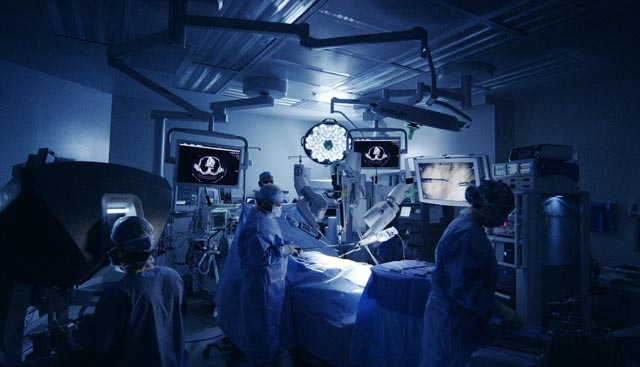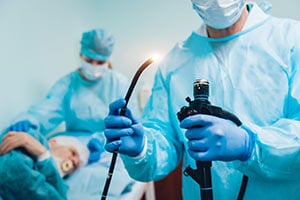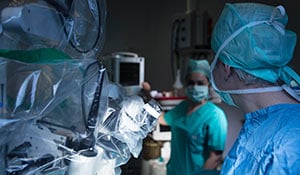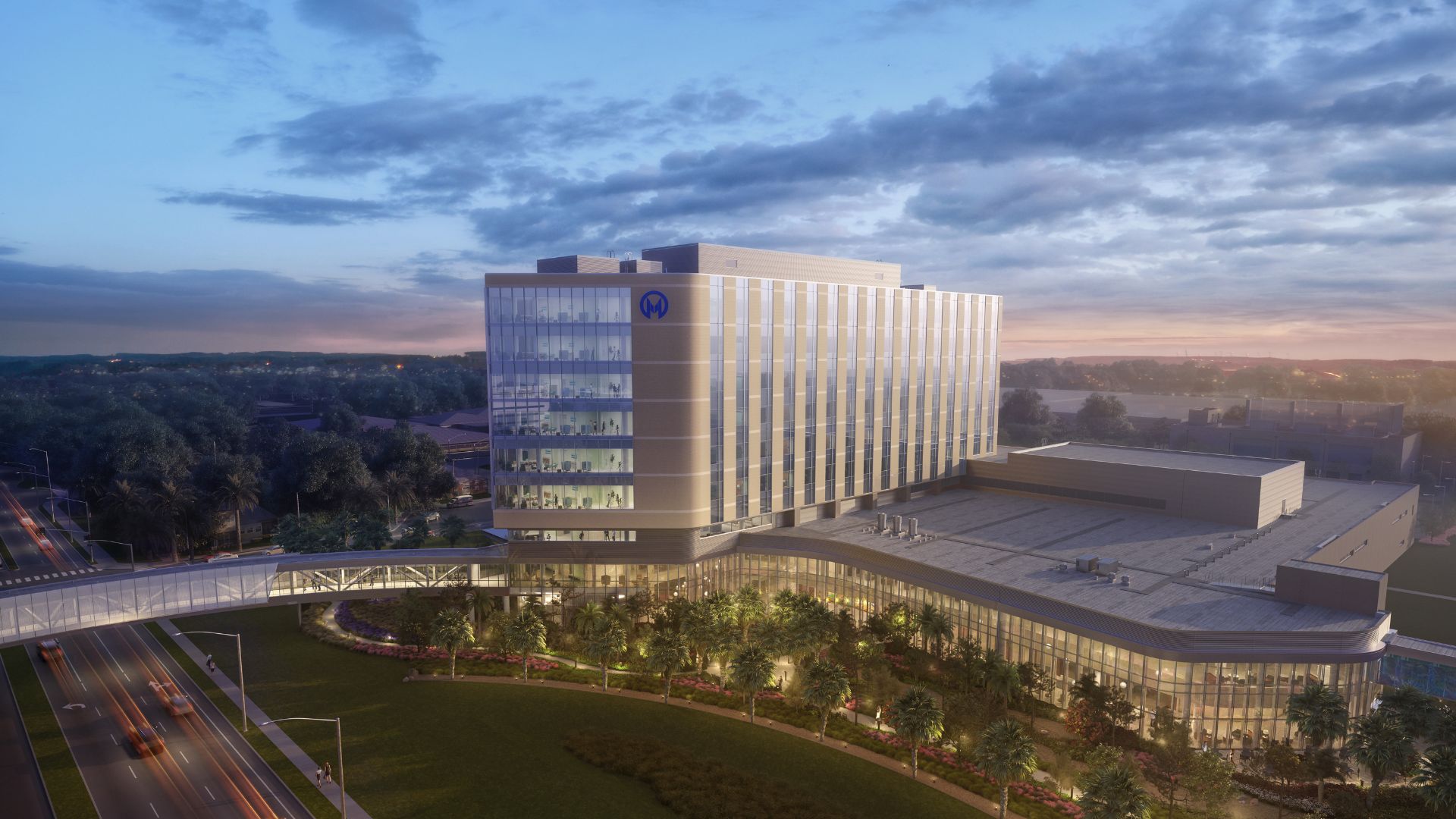Esophageal Cancer Surgery

Surgery is a common treatment option for early-stage esophageal cancer. Typically, a surgeon will remove part or all of the esophagus along with some surrounding healthy tissue, nearby lymph nodes and possibly the upper part of the stomach. Radiation therapy or chemotherapy may be administered before surgery to shrink the tumor and make it easier to remove, or after surgery to help prevent a recurrence.
To determine whether a patient is a candidate for esophageal cancer surgery, a surgeon will consider factors such as the type, size, location and stage of the tumor and the patient’s age and overall health. Because esophageal cancer is often diagnosed at a late stage, surgery is not the primary form of treatment in every case. However, if an esophageal tumor cannot be surgically removed, surgery may still be considered to relieve symptoms such as difficulty swallowing. For instance, a surgeon may place a stent to help keep the esophagus open.
The types of esophageal cancer surgery include:
Endoscopic mucosal resection
A precancerous lesion or early-stage tumor that is confined to the superficial lining of the esophagus may be removed through endoscopic mucosal resection. When performing this procedure, a surgeon will use a long, flexible tube with a light source and miniature camera attached to the end (endoscope). Depending on the location of the tumor, the physician will pass the endoscope through the mouth or rectum and carefully guide the tip to the area of concern in the esophagus. Next, the surgeon will pass small surgical instruments through a channel in the endoscope to shave off the cancerous tissue, which can eliminate the need to remove a large portion of the esophagus.
Esophagectomy
In many cases, surgery for esophageal cancer involves removing the tumor through a standard esophagectomy. After making one or more incisions in the neck, chest or abdomen, a surgeon will remove the affected portion of the esophagus and some surrounding healthy tissue and lymph nodes. To allow for the normal passage of food through the digestive tract, the surgeon will connect the remaining part of the esophagus to the stomach.
Esophagogastrectomy
An advanced esophageal tumor may require an esophagogastrectomy, which is more extensive than a standard esophagectomy in that it also involves removing the top portion of the stomach. If the remaining part of the esophagus cannot be connected to the remaining part of the stomach, the surgeon may connect the esophagus to the small or large intestine instead.

Minimally invasive and robotic esophageal cancer surgery
In some cases, a surgeon may perform esophageal cancer surgery using minimally invasive techniques and robotic assistance. For instance, the surgeon may use the da Vinci® Surgical System to perform robotic surgery, which requires only a few small incisions. During the procedure, the surgeon will use a 3D visualization system to view the surgical site in real-time while controlling tiny surgical instruments with wristed movements. The da Vinci system extends the range of motion of the human hand, allowing the surgeon to control the surgical instruments with an unprecedented level of precision. Compared to traditional open surgery, minimally invasive esophageal cancer surgery generally results in a shorter hospital stay, less post-operative pain, a faster recovery and minimal scarring.

What should I expect after esophageal cancer surgery?
The postoperative experience can vary widely based on factors such as the type of procedure and the patient’s overall health. Therefore, the best source of information about what to expect after esophageal cancer surgery is the surgeon who will perform it.
In general, most patients can expect to remain in the hospital for several days after esophageal cancer surgery. Some possible physical effects include:
- Pain – As with any surgery, a certain amount of pain is to be expected after esophageal cancer surgery. In most cases, the pain can be managed with medication.
- Difficulty swallowing – If the esophagus becomes narrower as a result of the surgery, it may affect the patient’s ability to swallow foods and/or liquids.
- Different nutritional needs – If the top portion of the stomach was removed during surgery, the patient may feel full faster when eating (early satiety), which may interfere with proper nutrition. If needed, dietary supplements may be considered.
- Heartburn – If the “lid” on the stomach (sphincter) was removed during esophageal cancer surgery, the patient may experience heartburn. Some patients find it helpful to sleep on their left side or raise the head of their bed approximately 6 inches, using gravity to relieve their symptoms naturally.
- Fatigue – Most patients need extra rest as their body recovers from surgery.
Frequently asked questions (FAQs) about esophageal cancer surgery
The following FAQs-related articles provide additional information about esophageal cancer surgery:
- What are some questions to ask before having esophageal cancer surgery?
- What are the possible side effects of esophageal cancer surgery?
- What are the risks of esophageal cancer surgery?
- What should I do to prepare for esophageal cancer surgery?
- Are there any activities to avoid after having esophageal cancer surgery?
Benefit from world-class care at Moffitt Cancer Center
The multispecialty team in Moffitt’s renowned Gastrointestinal Oncology Program offers the latest treatment options for esophageal cancer, including minimally invasive and robotic-assisted surgery. Moffitt is proud to be a nationally acclaimed leader in surgical innovation as well as a high-volume cancer center. As a result, our surgeons have acquired unrivaled expertise in performing esophageal cancer surgery, and our surgical outcomes consistently exceed the national averages. For these reasons and others, Moffitt is recognized by U.S. News & World Report as high-performing in gastroenterology surgery.
To learn more about esophageal cancer surgery, call 1-888-663-3488 or submit a new patient registration form online to request an appointment with a specialist in our Gastrointestinal Oncology Program. We do not require referrals.

Services and features at Moffitt McKinley Hospital include:
- Surgery operating and recovery rooms
- Radiology/diagnostic imaging
- Pathology and laboratory
- Publix Pharmacy
- Ancillary clinical services
- Patient and Family Center
- Café and cafeteria
- Gift shop
